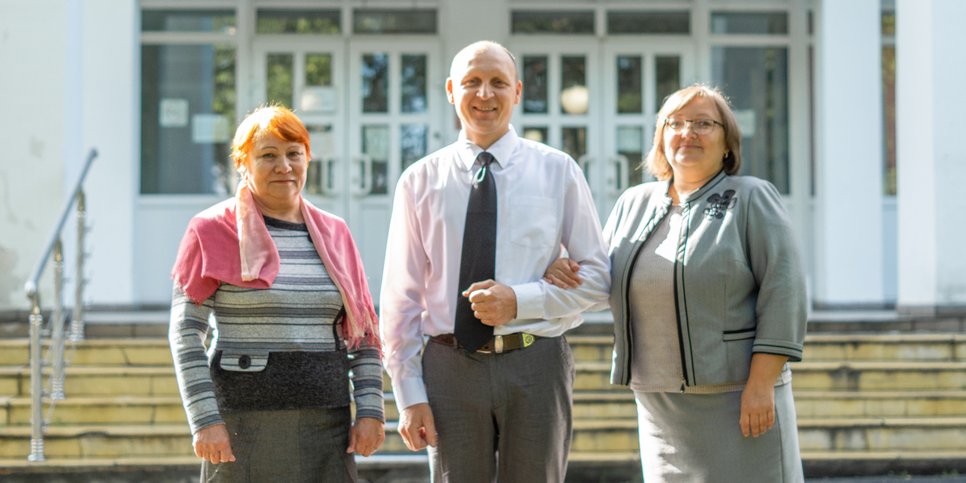On the photo (left to right): Vera Zolotova, Snezhana and Konstantin Bazhenov
On the photo (left to right): Vera Zolotova, Snezhana and Konstantin Bazhenov
Prosecutor's Office has Reached the Supreme Court of the Russian Federation, Seeking to Overturn a Rare Acquittal of Jehovah's Witnesses
Kamchatka Territory, MoscowThe Judicial Board for Criminal Cases of the Supreme Court of Russia will deal with the direct consequences of the decision of the Supreme Court in 2017 to liquidate all organizations of Jehovah's Witnesses in Russia and ban their activity.
On December 15, 2022, three residents of Kamchatka, who are Jehovah's Witnesses, will appear before the Criminal Board of the Supreme Court of Russia. A couple, who are both teachers, and a pensioner were found guilty of participation in the activity of a banned organization, but were acquitted by the Kamchatka Territory Court. The prosecutor's office has already filed a second cassation appeal against the acquittal.
The case against Konstantin and Snezhana Bazhenov and their friend Vera Zolotova (born in 1946) was initiated in 2018. After several rounds of hearings in the courts of the first, appeal and cassation instances, the Kamchatka Territory Court acquitted them in January 2022, which is a rarity against the backdrop of guilty verdicts (2 acquittals against 147 guilty verdicts). After the ban on the activity of organizations of Jehovah's Witnesses in 2017, Russian courts sentenced 88 believers to punishment in a penal colony, gave 147 believers a suspended sentence, and 28 believers a large fine under articles on organizing and participating in the activity of a banned organization. Only 6 believers were acquitted (the case of Pryanikov and others in Karpinsk and the case of the Bazhenovs and others in Yelizovo).
The prosecution of the Bazhenovs and Zolotova began when, in August 2018, all three spent two days each in a detention center and their homes were searched. They were charged with organizing the activity of a banned organization (part 1 of Article 282.2 of the Criminal Code of the Russian Federation). Pretrial detention was imposed on Konstantin Bazhenov but later he, as well as the women, were required to sign a recognizance agreement. A year later, in August 2019, the deputy prosecutor of the city of Yelizovo signed the indictment.
In October 2019, the Yelizovskiy District Court of the Kamchatka Territory started hearings but soon returned the case to the prosecutor for the elimination of violations, also pointing out the lack of distinction between lawful practice of religion and the continuation of the activity of a banned organization. The state prosecution succeeded in overturning the decision to return the case to the prosecutor. In March 2020, the judge of the Yelizovskiy District Court started the trial and announced his verdict in September of that year, after 11 hearings. He found the three believers guilty, not of organizing, but of participating in the activity of a banned organization (part 2 of Article 282.2 of the Criminal Code of the Russian Federation) and gave each a 2-year suspended sentence with a 3-year probation period. In November 2020, the Kamchatka Territory Court upheld the verdict on appeal.
The believers did not admit guilt and filed an appeal with the court of cassation. A year later, in November 2021, the Ninth Court of Cassation of General Jurisdiction in Vladivostok overturned the decision of the court of appeal and sent the case for a new appeal hearing to the Kamchatka Territory Court. In its cassation ruling the Court referred to the 28 October 2021 Resolution of the Plenum of the Supreme Court of the Russian Federation, which clarified that meetings for worship and joint ceremonies by themselves do not constitute a crime under Article 282.2 of the Criminal Code of the Russian Federation.
On January 18, 2022, the Kamchatka Territory Court, during a second appeal, overturned the verdict of the Yelizovsky District Court, rendered in September 2020, and pronounced an acquittal, which became effective immediately. On June 10, 2022, the Ninth Court of Cassation rejected the prosecutor's request to overturn the acquittal verdict. On September 30, 2022, Igor Tkachev, Deputy Prosecutor General of Russia, appealed to the Supreme Court of Russia asking to overturn the acquittal verdict and requesting that the case be sent for a new appellate consideration.
The believers appealed to the European Court of Human Rights regarding the decision to ban their organizations. In December 2018, when dozens of Jehovah's Witnesses had already been thrown behind bars, Mikhail Galperin, Deputy Minister of Justice of the Russian Federation, commented in an official response to the appeal: “The Russian authorities emphasize that the decision of the Supreme Court of the Russian Federation of 20 April 2017 and the appellate determination of the Appellate Chamber of the Supreme Court of the Russian Federation of 17 July 2017 do not assess the teaching of Jehovah's Witnesses or contain any restrictions or prohibitions on the individual exercise of the above-mentioned teaching.” Finally, in June 2022, in the judgment in the case of LRO Taganrog and Others v. Russia (32401/10), the European Court declared the liquidation of the administrative center and also 395 legal entities of Jehovah's Witnesses in Russia, banning their activities and seizing property and banning printed publications and the official website illegal; the Court also ruled to stop criminal prosecution of believers and to release prisoners. However, a few days later the enforcement of the ECHR ruling was discontinued in the Russian Federation.



